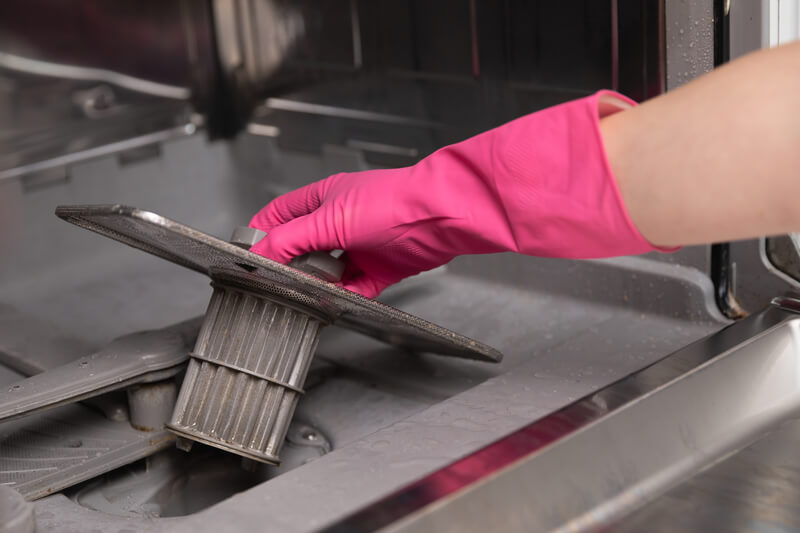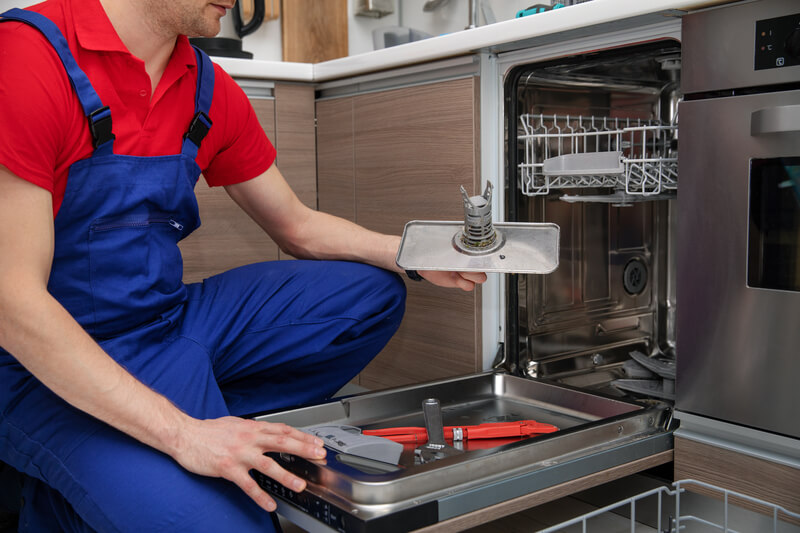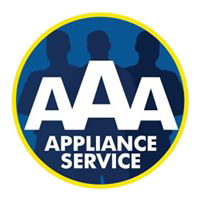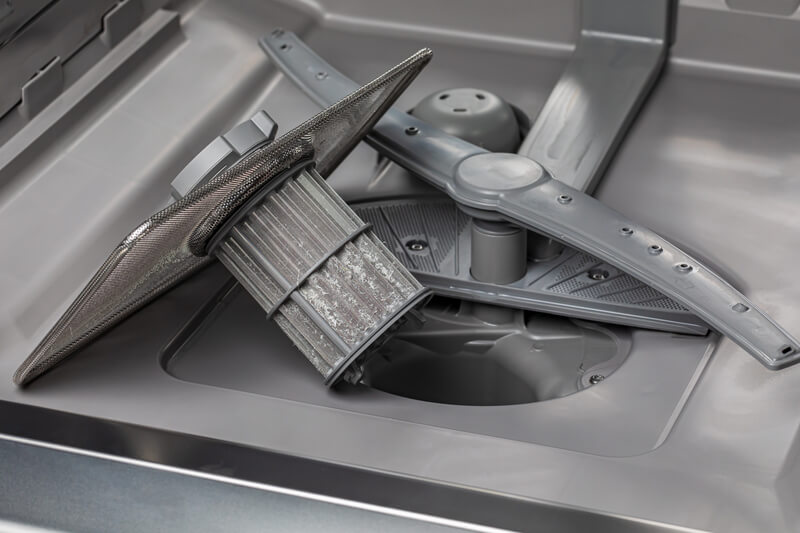Why You Should Clean Your Dishwasher Filter
Without much effort, the dishwasher thoroughly cleans your dishes of any food debris. However, you might need to be made aware that for the washer to function properly, the dishwasher, including its components, such as its filter, must also be cleaned.
Mold, bacteria, food particles, and other contaminants that make cleaning challenging or, worse yet, can create harmful conditions within your home’s kitchen can be found in a dirty dishwasher.
The built-up food residue in your dishwasher filter may cause your cleaned dishes to feel or look gritty. Additionally, the dishwasher filter may release unpleasant odors into the entire appliance, which may penetrate plastic or other absorbing materials. Therefore, it is essential to observe how your dishwasher smells and looks after cleaning to ensure successful washing and the long-term health of the appliances.
In this blog post, we will tackle why you should clean your dishwasher filter and learn more about the function of the dishwasher filter and how frequently it has to be cleaned. Learn how to clean the filter on your dishwasher, if one exists.
What is a Dishwasher Filter?
A dishwasher filter is an important component of a dishwasher that plays a crucial role in ensuring efficient and effective cleaning of dishes. It is designed to trap debris, food particles, and other impurities from the water used during the dishwasher’s cleaning cycle. The filter prevents these particles from re-circulating and redepositing on the dishes, which could lead to subpar cleaning results.
The dishwasher filter typically resides at the bottom of the dishwasher’s interior, near the drain. As water is sprayed onto the dishes, the filter captures and holds the solid waste.

What Are the Signs That Your Dishwasher Filter Needs Cleaning?
A dishwasher filter is crucial in keeping your dishwasher running efficiently and ensuring your dishes come out clean after each cycle. Over time, the filter can become clogged with food particles, grease, and debris, affecting the dishwasher’s performance.
Here are some signs that indicate your dishwasher filter needs cleaning:
- Dirty dishes after a cycle: One of the most obvious signs is when your dishes aren’t coming out as clean as they used to. If you notice leftover food particles, spots, or film on your dishes, it could be due to a clogged filter.
- Water not draining properly: A dirty filter can lead to drainage problems, causing standing water at the bottom of the dishwasher after a cycle. If you open the dishwasher door and see pooled water, it’s time to check and clean the filter.
- Unpleasant odor: Accumulated food debris in the filter can emit a foul smell, which may transfer to your dishes, making them smell less than fresh even after a wash.
- Longer cycle times: A clogged filter can impede water flow and disrupt the dishwasher’s cleaning process, resulting in longer than usual cycle times.
- Filter visibly dirty: Most dishwashers have a removable filter, usually located at the bottom of the dishwasher’s interior. If you notice a layer of food particles, grease, or other debris on the filter, it’s time for cleaning.
What Are the Common Causes of Clogged Dishwasher Filters?
A clog dishwasher filter can lead to poor cleaning performance and drainage issues. Several factors contribute to the accumulation of debris in dishwasher filters. Here are some common causes:
- Food Debris: The primary reason for clogged dishwasher filters is the presence of food particles and residue left on dishes before loading them into the dishwasher. Over time, these particles can build up and get trapped in the filter, reducing its effectiveness.
- Grease and Oils: Oily or greasy dishes can leave a residue on the filter, causing it to clog. As the dishwasher operates, the grease can solidify and create a barrier, making it difficult for water to pass through.
- Dishwasher Detergent Residue: Using too much detergent or the wrong type can accumulate soapy residue in the dishwasher’s filter, reducing efficiency.
- Utensils and Dishwasher Parts: Occasionally, small utensils or dishwasher components like broken glass, toothpicks, or labels from containers can get caught in the filter, causing a blockage.
- Lack of Regular Maintenance: Failure to clean the dishwasher filter regularly can gradually build up debris and residue, ultimately resulting in clogs.
Why Cleaning Dishwasher Filter Matters
As you operate your dishwasher, food, dirt, soap scum, and bacteria accumulate in the filter, resulting in dirty water, a home for bacteria and germs, and an unpleasant odor. All of this might end up in your dishes.
Dishes that have not been thoroughly washed may still contain bacteria and germs that might make you sick.
Additionally, if you have ever experienced a clogged drain, you know that bugs can enter the dishwasher via the drain and remain in the filter.
Even after giving your dishes a thorough rinse (even on a large load), you could still notice food particles on them due to clogged drains that reduce the effectiveness of the dishwasher.
To ensure that your dishes are cleaned thoroughly, the dishwasher filters function to capture extraneous food particles and buildup.
You’ll undoubtedly notice that dishes need to be cleaner and may even have a lingering smell if your filter isn’t frequently cleaned, which can significantly reduce the dishwasher’s efficiency.
Therefore, cleaning the filter is critical to protect your health and remove unpleasant odors, residue, and bacteria.
What Are the Benefits of Cleaning Your Dishwasher Filter?
Cleaning your dishwasher filter is an essential maintenance task that offers several benefits, ensuring a smooth and efficient functioning.
Here are the key advantages of regularly cleaning your dishwasher filter:
- Improved Cleaning Performance: Over time, debris, food particles, and mineral deposits can gather inside the dishwasher filter. This buildup can obstruct the water flow and detergent, resulting in less effective cleaning. By cleaning the filter regularly, you can ensure the water sprays evenly, and the dishwasher can remove all the food residues, leaving your dishes sparkling clean.
- Prevents Clogs and Drainage Issues: A clogged dishwasher filter can lead to drainage problems. As the filter becomes blocked, water may not drain properly, and you might notice standing water at the bottom of the dishwasher after a cycle. Regularly cleaning the filter prevents clogs and ensures proper drainage, preventing potential leaks and water damage to your kitchen.
- Extends Dishwasher Lifespan: When the filter is clogged, and the dishwasher has to work harder to clean your dishes, it puts extra stress on the internal components. Over time, this added strain can lead to premature wear and tear, shortening the lifespan of your dishwasher. Cleaning the filter regularly can extend the appliance’s life and save money on costly repairs or replacements.
- Energy Efficiency: A clean dishwasher filter allows the machine to operate more efficiently. With unobstructed water flow, the dishwasher can use less energy to heat the water and complete its cycles faster. This results in lower energy consumption and potentially reduced energy bills.
To enjoy these benefits, we recommend checking and cleaning your dishwasher filter at least once a month or more frequently if you run the dishwasher daily or notice any performance issues. Consult your dishwasher’s user manual for specific instructions on locating and cleaning the filter, as the process can vary depending on the dishwasher model.
But if you need help with your kitchen appliances, AAA Appliance Repair West Palm Beach is here to help you; call us at (561) 689-8885.

Why You Should Clean Your Dishwasher Filter
Cleaning your dishwasher filter is essential for several reasons:
- Efficient cleaning: The filter in a dishwasher is responsible for trapping food particles, debris, and other solid residues from the dishes during the wash cycle. If the filter becomes clogged or dirty, it can impair the dishwasher’s ability to clean effectively. Regularly cleaning the filter ensures it remains blockage-free, allowing your dishwasher to perform at its best.
- Prevents foul odors: A dirty dishwasher filter can lead to unpleasant odors in your dishwasher and even on your freshly cleaned dishes. Decomposing food particles and grease trapped in the filter can produce foul smells that will linger in the dishwasher, impacting the cleanliness of your next load.
- Extends dishwasher lifespan: Cleaning the filter can help prolong the life of your dishwasher. When the filter is clogged, the dishwasher has to work harder to clean the dishes, putting extra strain on its components. Over time, this increased workload can lead to early wear and tear, potentially trimming the lifespan of your kitchen appliance.
- Reduces the risk of damage: If the filter is not cleaned regularly, debris may accumulate and cause blockages in other parts of the dishwasher, such as the pump or spray arm. That can lead to high-cost repairs or, in severe cases, permanent damage to the dishwasher.
- Improves water efficiency: A clean filter ensures that water can flow freely through the dishwasher, allowing it to use water more efficiently during each wash cycle. It saves water, reduces energy bills, and contributes to environmental conservation.
- Maintains hygiene: A dirty filter can harbor bacteria and mold, which can transfer to your dishes during the wash cycle. Regular cleaning of the filter helps maintain a hygienic environment for your dishes and kitchenware.
If you need help cleaning your dishwasher filter or any dishwasher problems, call AAA Appliance Repair West Palm Beach, and we will be happy to help you with your problem.
How to Clean the Dishwasher Filter
It’s quick and easy to clean the filter. Additionally, it only requires to be cleaned once a month in general, while some models might need to be cleaned every two to three weeks. Read the dishwasher’s manual to ensure you clean as frequently as necessary.
- Find and remove the filter. To begin cleaning the drain, remove the lowest rack and use a cloth to remove debris and dirt from the area surrounding the filter. Turn the filter to unlock it and pull it out. To give you an idea, it resembles a cylinder. Not all machines have one.
- Soak the filter. Allow it to soak in a solution of warm water and a few drops of dish soap to help loosen any food particles that may have become stuck.
- Clean the filter. To clean the filter, utilize an old sponge (not a scrubby one) and a toothbrush. We suggest using an old sponge rather than your standard dish sponge to reduce cross-contamination.
- Go heavy-duty if necessary. Is the filter still dirty? Baking soda and vinegar work nicely together, and so does regular dish soap.
If you use your dishwasher frequently, clean the drain more often, ideally every three to six months. Check your manual for details; depending on the model, some manufacturers may advise cleaning it every two to three weeks.
Generally, you should clean your filter if you notice any grit or grime within your dishes.
Utilize a Vinegar Rinse Between Cleanings
A vinegar rinse may help eliminate the odor-causing food particles between filter cleanings if you experience unpleasant appliance odors. To maintain it, increase the cleaning power through vinegar and baking soda. Rinse for around two weeks between cleanings.
Run a dishwasher cycle without other things in the appliance, sprinkle baking soda in the filter, and then fill a glass measure with white distilled vinegar. To prevent odors and buildup, vinegar and baking soda will help clean the appliance and filter it again.
Pro tip:
- Don’t put dishes inside with food residue on them if you intend to clean the filter more frequently.
- Remove any food from the plates and utensils, then rinse them off.
- Please put them in the washer after that.
As a result, the filter will become less clogged with food particles.
Don’t Let a Broken Dishwasher Ruin Your Day!
Are you tired of dealing with the hassle of a broken dishwasher filter? Don’t let this minor issue ruin your day and impact the efficiency of your kitchen chores. At AAA Appliance Repair West Palm Beach, we are here to help with hassle-free dishwasher filter repairs! Our expert technicians specialize in restoring your dishwasher’s efficiency so you can say goodbye to hand washing dishes.
Aside from the dishwasher, we repair items like garbage disposal, cooktops, washers, dryers, and other appliances.
If you have any questions or want more information, call us at (561) 689-8885.



